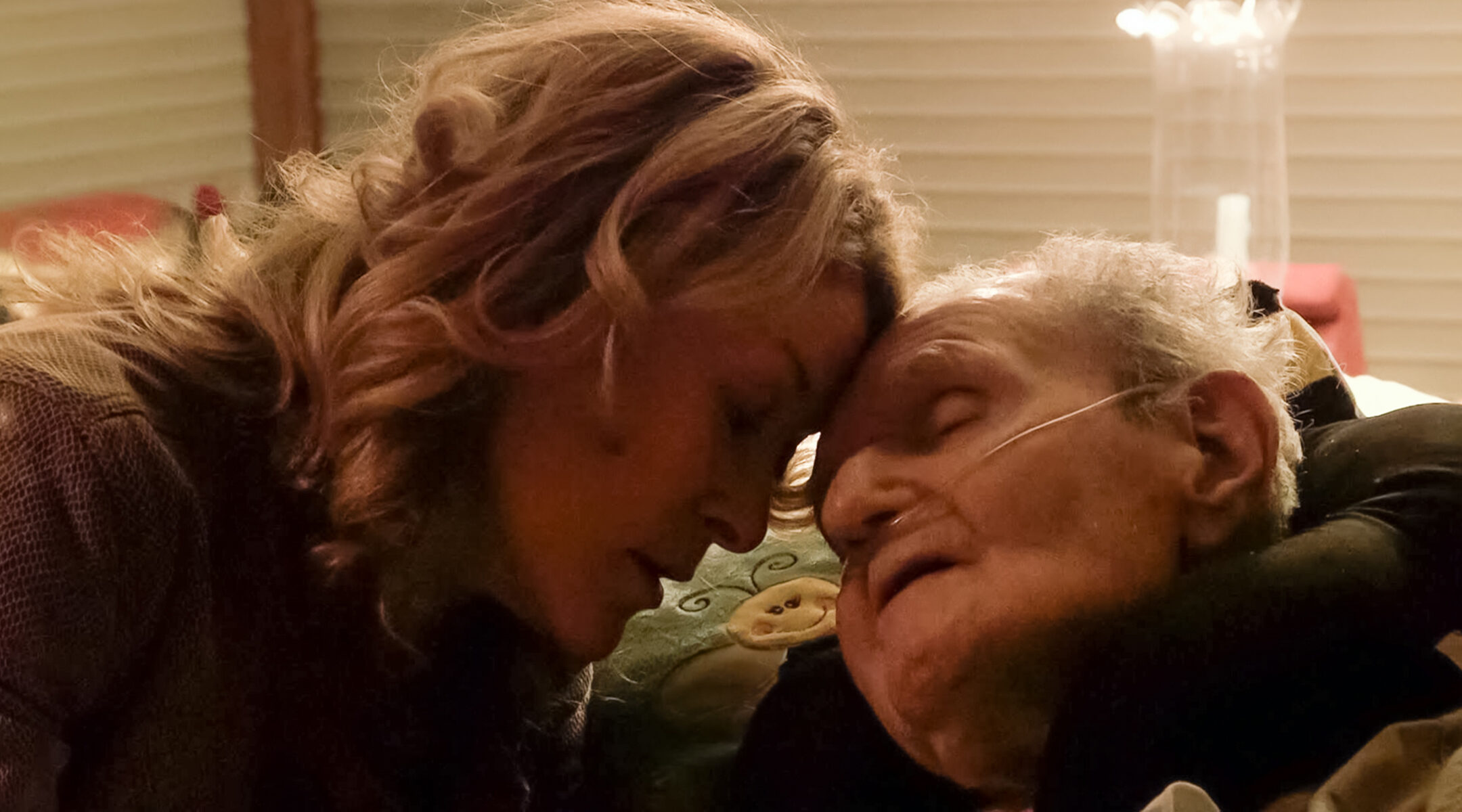(JTA) – When Rabbi Rachel Timoner’s dad Eli told his family of his decision to end his life, Rachel knew what would soon be asked of her: to officiate his funeral, something he had told her he wanted since she became ordained.
This presented a challenge for Rachel, the senior rabbi at Brooklyn’s Congregation Beth Elohim. Being her father’s rabbi “wasn’t what I wanted,” she says in the new documentary, “Last Flight Home,” which chronicles Eli’s final days from the perspective of his family. The film, directed by Rachel’s sister Ondi Timoner, is a raw, intimate document of the realities of end-of-life care, as well as a meditation on the ways Jewish law encourages setting one’s affairs in order before the moment of death.
A former airline executive and prolific fundraiser for Miami’s Jewish federation, Eli Timoner was felled by a stroke in his 50s and spent 40 years of his life with a physical disability — the first in a series of painful steps that led to him losing much of his wealth and stature in the business and philanthropy world. (He suffered his stroke a few months after a plane operated by his airline, Air Florida, crashed into the Potomac River, killing 78 people; the film doesn’t discuss the crash, but January, one week before its premiere at the Sundance Film Festival, marked 40 years since it happened.)
When Eli’s health began to get markedly worse in 2020, he began to insist that he end his own life and began the legal process by which he could acquire the lethal medication in California.
“He made a sudden decision, and he was very adamant about it,” Ondi Timoner told the Jewish Telegraphic Agency. “He would go from calling one of us to the next, to the next: ‘Please, help me die. If you love me, help me die.’ He was saying the Shema to Rachel.”
Ondi’s first instinct, she said, was to grab a camera. As a prolific director, her documentaries (including “We Live In Public” and “Coming Clean”) have won awards at the Sundance Film Festival. But at first, she didn’t think she was filming anything more than a memorial video, and only wanted “to bottle up and capture his personality, his voice, for the family.” So she filmed gatherings even as she grieved along with her subjects (including her dutiful mother Lisa and apprehensive brother David), who often pop out from behind the camera to share a tender moment — or even attempt to “direct” a scene.
It was only in the months after Eli’s death, as Ondi was editing the footage and seeing the gut reaction her friends and family had to watching someone in pain make the decision to end his own life, that she decided to try to turn it into a feature film.
The film chronicles the two weeks in early 2021 before Eli takes the “goodbye powder,” as a series of doctors sign off on his death and he bids farewell to his family and friends from the comfort of his Pasadena home, where he is on bedrest. It also depicts the “T-team,” as the Timoners call themselves, helping Eli go through the traditional Jewish end-of-life ritual of viddui, or seeking forgiveness for one’s sins before death. Later, after his death, we also see them performing the act of tahara, or cleaning his body for burial.
“I’m more of just a generally spiritual person, but it was these rituals. They were like touchstones for us,” Ondi said.
During the process, Rachel finds herself less and less willing to be her father’s rabbi. “As he’s getting closer and closer to death, I am more and more clear that I am his daughter,” she says in the film.

Filmmaker Ondi Timoner, second from right, marries her partner Morgan Doctor in Telluride, Colorado, in September 2022 following a screening of “Last Flight Home,” a film about her father’s death. Her sister, Rabbi Rachel Timoner, center, officiates. (Courtesy of Ondi Timoner)
But there was a happy coda after all the grief, Ondi said. Six months after Eli’s death, the “T-team” reunited at the Telluride Film Festival to screen the documentary — where Rachel, in her capacity as rabbi, officiated Ondi’s wedding to her partner, Morgan Doctor, who composed the music in the film.
“It was the most perfect hour of our lives,” Ondi said. She recalled how Eli had blessed their union on camera, on his deathbed (a moment that made it into the film). Now they were getting married at an event celebrating his life, under a makeshift huppah that included a tablecloth from Eli’s mother, with the entire family present once again.
“If you think about the film, and you think about what Dad says to me the night before he dies: I say, ‘So wasn’t it important to say goodbye to all these people?’ And he says, ‘Yes, but look forward. Don’t look back,’” Ondi recalled. “And I feel like that was the energy that this occasion brought.”
For a Jewish family that was never particularly spiritual growing up, Ondi said, their patriarch dying brought everyone, including Eli, closer to Judaism.
That was true even though “Last Flight Home” captures the Timoners helping someone end his life, which is emphatically discouraged by Jewish law and tradition. The Central Conference of American Rabbis, the rabbinical arm of the Reform movement that includes Rachel Timoner, announced in August that it would support Canada’s laws permitting medical aid in dying. It said it would not support California’s law, which the Timoners relied on, because America’s lack of universal healthcare “means that we cannot be certain that an individual in the U.S. considering medical assistance in dying is not being affected by their own or their family’s financial situation, or by obstacles to obtaining necessary and appropriate treatment.”
Though Rachel Timoner is a prominent activist on a range of social issues, she didn’t anticipate end-of-life care being one of them. But knowing how the image of a rabbi paying for her father’s life-ending drugs on film would seem to the Jewish community, she wrote an op-ed in the Forward prior to the movie’s release explaining her decision.
“I do not wish to create controversy on this issue, and I would not have chosen to make this film,” Rachel Timoner wrote. “I would not have chosen for my father’s death to be viewed by the public at all, and I would not have chosen to champion this issue. But I have cared for others who desperately wished for this choice at the end of their lives, and I think it might be time for the Jewish people to reconsider our views on this important matter.”
Now there’s a good chance “Last Flight Home,” and the Timoners’ story, will become a Jewish face of the right-to-die debate. Death With Dignity, an organization that advocates for policies allowing medically aided death, reached out to Ondi Timoner after the film’s screening to ask if they can use it in their own materials.
It’s a prospect she welcomes, she said, adding, “It’s a dream for me as an artist, and as a daughter, that my father’s suffering could come to this kind of healing for people.”
“Last Flight Home” opens Oct. 7 at New York’s IFC Center and Oct. 14 in Los Angeles, with other cities to follow.
JTA has documented Jewish history in real-time for over a century. Keep our journalism strong by joining us in supporting independent, award-winning reporting.






